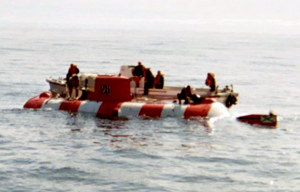AS-28

AS-28 surfacing in the Bering Sea
|
|
| History | |
|---|---|
| Name: | AS-28 |
| Laid down: | January 1982 |
| Launched: | 10 December 1985 |
| Commissioned: | 12 August 1986 |
| Status: | in active service |
| General characteristics | |
| Class and type: | Priz-class deep-submergence rescue vehicle |
| Displacement: | 55 tonnes (54 long tons) |
| Length: | 13.5 m (44 ft 3 in) |
| Beam: | 3.8 m (12 ft 6 in) |
| Height: | 4.6 m (15 ft 1 in) |
| Speed: |
|
| Range: | 21 nmi (39 km) |
| Endurance: |
|
| Test depth: | 1,000 m (3,300 ft) |
| Capacity: | 20 passengers |
| Crew: | 5 |
AS-28 is a Priz-class deep-submergence rescue vehicle of the Russian Navy, which entered service in 1986. It was designed for submarine rescue operations by the Lazurit design bureau in Nizhny Novgorod. It is 13.5 m (44 ft) long, 5.7 m (19 ft) high, and can operate up to a depth of 1,000 m (3,300 ft).
On August 5, 2005 AS-28, under the command of Lieutenant Vyacheslav Milashevskiy, became entangled with the aerial of a hydrophone array off the coast of the Kamchatka Peninsula, in Berezovaya Bay, 70 km southeast of Petropavlovsk-Kamchatskiy, Kamchatka Oblast. The aerial, anchored by 60-tonne concrete blocks, snared the propeller of the submarine, and the submarine then sank to the seafloor at a depth of 190 m (600 ft). This was too deep for the ship's complement of seven to leave the submarine and swim to the surface. British rescuers and Russian officials stated that fishing nets also had entangled the vessel.
On August 6, Russian President Vladimir Putin ordered Russian Minister of Defence Sergei Ivanov to fly to Petropavlovsk-Kamchatsky to oversee the rescue operation, which was under the command of the Commander of the Russian Pacific Fleet, Admiral Viktor Fedorov.
On August 7, all seven sailors were rescued after the cables snaring their submarine were cut by a British remotely operated vehicle (ROV). The submarine surfaced at 4:26 p.m. local time on Sunday and all seven crewmen exited the vessel without assistance.
The Russian Navy requested assistance after at least 24 hours, much faster than their response when the Kursk sank on August 12, 2000. It was suggested that the Russians may have called for help so quickly this time as they were on a recent exercise with NATO forces for just such an eventuality.
...
Wikipedia
